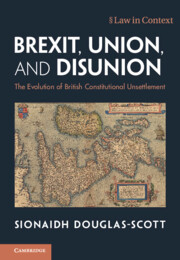Book contents
- Brexit, Union, and Disunion
- Law in Context
- Brexit, Union, and Disunion
- Copyright page
- Contents
- Figures
- Introduction
- Part I Five Case Studies of Acts of Union and Disunion
- 1 Scotland
- 2 Ireland
- 3 Britain’s Loss of Its North American Colonies in the Eighteenth Century
- 4 The Constitutional Status of the British Empire and Commonwealth
- 5 Britain and Europe
- Part II Five Themes
- Index
4 - The Constitutional Status of the British Empire and Commonwealth
from Part I - Five Case Studies of Acts of Union and Disunion
Published online by Cambridge University Press: 26 October 2023
- Brexit, Union, and Disunion
- Law in Context
- Brexit, Union, and Disunion
- Copyright page
- Contents
- Figures
- Introduction
- Part I Five Case Studies of Acts of Union and Disunion
- 1 Scotland
- 2 Ireland
- 3 Britain’s Loss of Its North American Colonies in the Eighteenth Century
- 4 The Constitutional Status of the British Empire and Commonwealth
- 5 Britain and Europe
- Part II Five Themes
- Index
Summary
There was no legal definition of the British Empire and it possessed no explicit constitutional meaning. The empire was diverse and incoherent and terminology was not very clear. The terms ‘colony’, ‘dominion’, ‘possession’, ‘plantation’, and other expressions were used in different ways at different times. Indeed, an anti-formalist attitude tended to prevail – often eschewing formal law in favour of informal assurances, customs, and conventions. There was no attempt to establish a uniform legal code. And the sovereignty of the Parliament in London was only one of many types of sovereignty that existed. Much of the British Empire lent itself to a more pluralistic type of sovereignty – one that was divided, shared and indeterminate. Indeed, it was likely that power was the only unifying factor underlying the empire, aided by British naval supremacy, and the fact that, in the nineteenth century, global communications were predominantly in British hands. However, that power could not be derived from a unified, coherent account of legal and political sovereignty. And power by itself lacks legitimacy – it must be validated by something else – which is where sovereignty becomes relevant, in providing that grounding. Yet, the claims of sovereignty made by the empire were often mutually self-contradictory.
Keywords
- Type
- Chapter
- Information
- Brexit, Union, and DisunionThe Evolution of British Constitutional Unsettlement, pp. 184 - 253Publisher: Cambridge University PressPrint publication year: 2023

